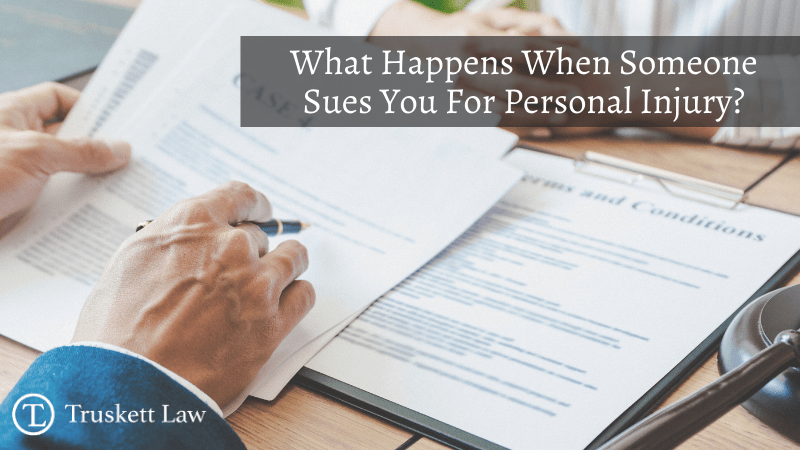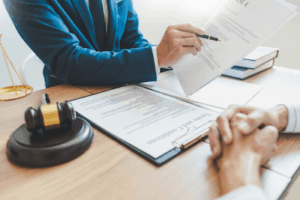
23 Sep What Happens When Someone Sues You For Personal Injury?
What You Should Know About Being Sued for Personal Injury
Personal injury lawsuits are some of the most common civil cases in any state. According to a recent report, more than 1.2 million people had injuries that led to personal injury claims and more than 2 million others were injured and did not file a claim or seek compensation. When someone sues you for personal injury, it can be a difficult and time-consuming process. You must hire an experienced personal injury lawyer that can help you with all matters related to your case.
So, what happens when someone sues you for personal injury? When someone sues you for a personal injury, it means they are accusing you of negligence in regards to their safety. In addition, you had a duty of care. This means you had a responsibility to provide safety or did not use reasonable safety measures to prevent an incident. If they perceive this, then they can sue you. It is important as soon as you receive a notice that someone plans on suing you for personal injury, that you contact good legal counsel.
In some cases, the story of the injured party is enough to show negligence. Oftentimes, it depends on what they were doing and if your actions contributed to their injuries. In other cases, the story of one or more witnesses can be used as evidence. If there is no evidence or witness testimony, the next step is to prove negligence.
Proof of Negligence
First, the plaintiff must prove you owe a duty of care to them. This means that it was reasonable for you to keep your behavior in check so as not to cause harm. Then, you have a legal obligation to not neglect this duty of care and cause personal injury or damages. You did breach this duty of care if you failed to exercise reasonable care toward them. This breach of duty is what makes you liable for the damages you caused, or at fault.
The word ‘negligence‘ means that someone’s carelessness resulted in an act that leads to physical harm. If the duty of care isn’t met and an accident occurs, there may be negligence on the part of the responsible party.
For example, if someone backs out into traffic and causes an accident it could be because they didn’t look before they reversed. It could also be because they weren’t driving the speed limit, so it took them longer to stop.
Perhaps they didn’t have their lights on as they drove. This means that if you rear-ended them because of any of these reasons, you would be found liable for any damages that occurred as a result.
Showing Evidence
 After a duty was breached, the next step is to prove that the plaintiff suffered damages as a result of negligence. These damages can be physical, psychological, or financial and include things like medical bills, lost wages, and pain and suffering.
After a duty was breached, the next step is to prove that the plaintiff suffered damages as a result of negligence. These damages can be physical, psychological, or financial and include things like medical bills, lost wages, and pain and suffering.
If they can provide evidence of these damages with receipts or witness testimony, it will add strength to their case.
In many cases, there is a key piece of evidence that can help to establish whether the defendant was negligent. This is often called “proof beyond a reasonable doubt” or in some cases “the preponderance of the evidence”, which means that it’s more likely than not that they were negligent.
If you have been notified that you are being sued for a personal injury case, then you should speak to an attorney about your situation. They will help protect your rights and help you to build your case. They will also be able to provide any additional guidance or information that might be necessary.
Personal injury lawsuits can be filed for several reasons; however, they all revolve around the defendant breaching their duty of care. Negligence can often be proven by “proof beyond reasonable doubt” which means that it’s more likely than not that they were negligent.
A personal injury attorney can help you to navigate these claims. They can also build a case for you, and help you either resolve these issues with the least amount of drama. Also, if you have a reasonable case of proving you or your company did not involve in negligent behavior, the attorney can help shine a light on those circumstances. This is why it is important to get great counsel when dealing with personal injury cases.
Settling or Going to Trial
A personal injury lawyer will help you decide whether to settle out of court or take your case to trial. If you’re unable to reach an agreement with the other party, filing a claim may be the best option. However, it is important to understand that personal injury claims can be complicated. Your attorney will explain all of your legal options and offer professional advice on how to best move forward with the case.
Definition of Personal Injury
Personal injury is a legal term used when you’re either injured in some way or when someone else’s negligence has caused you harm. Personal injury cases can include car accidents, slip and falls, or any other negligent behavior that damages another person.
When someone files a personal injury case against you, the claimant (the person filing the claim) must show proof that the defendant (the person the claim is filed against) was negligent, meaning that they didn’t exercise reasonable care toward the claimant.
Many people are confused by personal injury cases because they don’t know how to decide whether or not someone will be found liable. Determining the defendant’s liability can be difficult, but there are several factors involved in these cases.
What to Do If You Have Been Found Liable in a Personal Injury Case
It’s important to know what your options are moving forward. For some cases where negligence was involved, a civil action can be filed on your behalf. This means that you (the defendant) will file a counterclaim against the claimant (the person who filed the personal injury claim).
Once you’ve filed your civil action, the court will decide whether or not they agree with your argument, which may be that it was the claimant’s negligence that caused their injuries. If they agree with you (i.e., they find the claimant’s negligence to be greater than your own) then you will not have to pay their restitution.
However, if the court rules against you, this may mean that you are financially responsible for paying back any damages awarded in the original personal injury case. This would include financial restitution, emotional distress, or even punitive damages (damages meant to stop the defendant from repeating their negligent behavior).
If you need help filing a civil action for personal injury or you’ve been named in an existing claim, speak with your lawyer. They will work with you to build your case and figure out the best way forward so that you can have peace of mind while they handle everything else.


Sorry, the comment form is closed at this time.